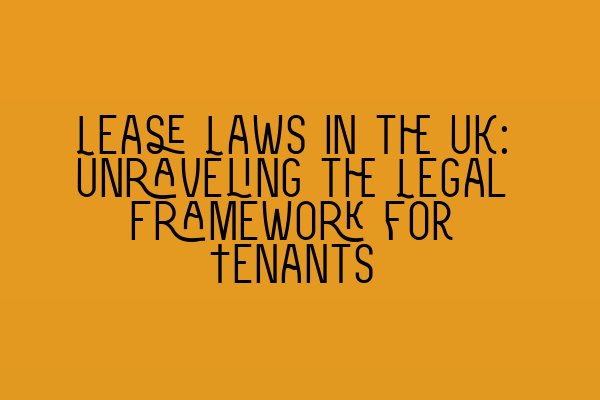Lease Laws in the UK: Unraveling the Legal Framework for Tenants
Introduction
Renting a property is a common choice for many individuals across the UK. Whether you’re a student, a young professional, or a family looking for a new home, leases play a crucial role in defining the tenant-landlord relationship. Understanding the lease laws in the UK is essential for both tenants and landlords to ensure a smooth and fair tenancy.
In this blog post, we’ll delve into the legal framework surrounding lease laws in the UK, uncovering the key aspects that tenants need to be aware of. From crucial rights and responsibilities to the importance of lease agreements, we’ll explore it all. So, let’s get started!
1. The Lease Agreement: A Written Contract
One of the most fundamental aspects of renting a property in the UK is the lease agreement. A lease agreement is a legally binding contract between the tenant and the landlord, outlining the terms and conditions of the tenancy. This written contract serves as a foundation for the tenant-landlord relationship, providing clarity and protection to both parties involved.
A lease agreement typically includes crucial information such as the duration of the tenancy, rent amount and payment frequency, deposit requirements, and any specific tenant or landlord obligations. It is crucial for tenants to thoroughly review and understand the lease agreement before signing it to ensure they fully comprehend their rights and responsibilities.
2. Tenants’ Rights and Protections
Tenants in the UK are entitled to several rights and protections under lease laws. These rights aim to ensure fair treatment, safety, and security for tenants during their tenancy. Here are some key rights and protections that tenants should be aware of:
a. Right to a Safe and Habitable Property: As a tenant, you have the right to live in a property that is safe, habitable, and free from hazards. It is the landlord’s responsibility to ensure the property meets certain health and safety standards.
b. Protection Against Unfair Eviction: The law in the UK protects tenants from unfair eviction. Landlords can only evict tenants under specific circumstances, such as non-payment of rent or breach of the lease agreement. Proper notice must be given, and due process must be followed.
c. Protection Against Unfair Rent Increases: Tenants have the right to be protected from unfair rent increases. Landlords must follow specific guidelines when raising the rent, ensuring it is reasonable and in line with market rates.
d. Protection of Tenancy Deposit: When a tenant pays a deposit, it must be protected in a government-approved deposit protection scheme. This ensures that tenants’ deposits are safeguarded and can be returned at the end of the tenancy, subject to any necessary deductions.
3. Tenant Obligations
While tenants enjoy certain rights and protections, they also have obligations that they must fulfill during their tenancy. These obligations aim to maintain a harmonious relationship between the tenant and the landlord. Some common tenant obligations include:
a. Paying Rent on Time: Tenants are responsible for paying their rent on time, as outlined in the lease agreement. Failure to do so may lead to legal consequences, including potential eviction.
b. Reporting Maintenance Issues: It is the tenant’s responsibility to report any maintenance issues or repairs needed in the property to the landlord promptly. This allows the landlord to address the problems in a timely manner.
c. Taking Care of the Property: Tenants must take reasonable care of the property and avoid causing any intentional damage. Regular cleaning and proper maintenance are essential to ensure the property remains in good condition.
4. Dispute Resolution
Disagreements and disputes between tenants and landlords can arise during the tenancy. Lease laws in the UK provide various mechanisms to resolve these disputes. It is advisable for tenants and landlords to attempt to resolve issues amicably through open communication and negotiation.
If informal resolution attempts fail, tenants can seek assistance from relevant organizations such as the Citizens Advice Bureau or contact a solicitor specializing in property law to explore legal options. The courts can also play a role in resolving disputes, ensuring that both parties have a fair and impartial hearing.
Conclusion
Lease laws in the UK form the legal framework governing tenant-landlord relationships and are essential for a successful tenancy. Understanding your rights and responsibilities as a tenant is crucial to ensure a smooth and enjoyable renting experience. By familiarizing yourself with the lease agreement, knowing your rights and protections, fulfilling your obligations, and knowing how to resolve disputes, you can navigate the complexities of lease laws with confidence.
For further insights into contract law, we recommend checking out these related articles:
– Interactive SQE Mock Tests for Contract Law: Test Your Knowledge
– Contract Law Reforms: An Analysis of Recent Changes
– Parties in a Contract: Rights and Responsibilities
– The Importance of Ethics in Contract Law: A Comprehensive Guide
– Unveiling Duress and Undue Influence in Contracts
Remember, knowledge is power, and being well-informed about the lease laws in the UK will empower you as a tenant to protect your rights and make informed decisions throughout your tenancy.
